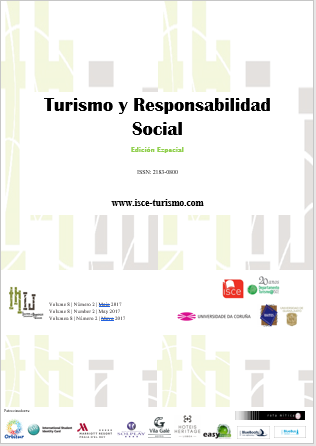Formas de análisis de la relación entre anfitriones y turistas
DOI:
https://doi.org/10.57883/thij8(1)2017.30346Palavras-chave:
Intercambio social, Sociología del turismo, Anfitriones e invitados, Turismo rural sustentávelResumo
El presente artículo tiene como objetivo presentar algunos aspectos del estudio de la relación entre “anfitriones e invitados” en el ámbito del turístico (en el contexto anglosajón, “host &guest”). Esta relación tiene cada vez más importancia en el llamado turismo sostenible que se basa en el tipo de relación que los residentes en zonas con “encanto” y con potencialidades turísticas, establecen con los visitantes. A nuestro juicio, de cómo evolucione esta relación, depende buena parte de la sostenibilidad del “negocio” turístico. El intercambio entre ambos grupos de actores (anfitriones e invitados) es la base de esta relación. Este intercambio se puede desarrollar de diferentes modos: puedeser equilibrado o desequilibrado, en función de las capacidades negociadoras de cada parte. Puede favorecer o no la dependencia de una de las partes, más aún cuando las alternativas viables al negocio turístico son limitadas. Por el contrario, puede favorecer la independencia y el empoderamiento de las partes, si existen contrapartidas aceptables y opciones alternativas. Este intercambio, en fin, estará en función de una serie de variables de entre la que destacamos el grado de exposición de “los anfitriones” al fenómeno turístico. La Teoría del Intercambio Social (TIS) ofrece un paradigma explicativo del papel de las estrategias que los diferentes actores pueden desplegar en este contexto relacional. En el plano empírico, la literatura ofrece ejemplos de cómo abordar analíticamente la relación entre anfitriones y turistas. En este artículo se explican algunas investigaciones, los diseños muéstrales y las escalas que se han confeccionado, validado y aplicado. Todo ello tiene el interés de poder ser replicados en contextos diferentes a los que se han utilizado para su generación y desarrollo, en especial en zonas rurales de regiones periféricas.
Referências
Ap, J., (1992). Residents' perceptions on tourism impacts. Annals of Tourism Research, Issue 19, pp. 665-690.
Blau, P., (1964). Exchange and power. New York: Wiley.
Bryant, E. G. & Napier, T., (1981). The aplication of social exchange theory to estudy of satisfaction with outdoor recreation facilities. En: Outdoor recreation planning, perspectives, and research. Dubuque: Kendall Hunt Publishing Company, pp. 83-98.
Campbell, D., & Stanley, J. (1988). Diseños experimentales y cuasi experimentales en investigación social. Amorrortu.
Castaño, J. M. (2005). Psicología social de los viajes y del turismo. Madrid: Thomson.
Feleppa, R. (1986). Emics, Etics and Social Objectivity. Current Anthropology(27), 243-255.
Castaño, J. M., (2005). Psicología social de los viajes y del turismo.. Madrid: Thomson.
Díaz Armas, R., (2010). La actitud del residente en el destino turístico de Tenerife:
evaluación y tendencia. Pasos. Revista de Turismo y Patrimonio Cultural, núm. 8(4),
pp. 431-444
García Ferrando, M. (2008). Socioestadística. Introducción a la estadística en sociología. Madrid: Alianza Editorial.
Giner, S. & Espinosa, L. D., (1998). Diccionario de Sociología. Alianza Editorial..
Gutiérrez Brito, J., (2007). La investigación Social del turismo. Madrid: Thomson.
Huete y Mantecón, (2015). La construcción de la opinión pública sobre el turismo: Crítica a la teoría del intercambio social, en Hiernaux-Nicolas, D. (coord.) Turismo, sociedad y territorio: una lectura crítica. Querétaro: Universidad Autónoma de Querétaro, México.
Huete, R. (2010). Opiniones y actitudes ante el turismo residencial en el sur de la
Comunidad Valenciana. Pasos. Revista de Turismo y Patrimonio Cultural, núm. 8(4),
pp. 445-461
Jacobsen, (2000). Ant tourist attitudes Mediterranean charter tourism. Annals of Tourism Research, pp. 284-300.
Pizam, A. (1978). Tourism Impacts: the social cost to the destination community as perceived by its residents. Journal of Travel Research, 164, 8-12
Mantecón, A., (2008). La experiencia del turismo. Un estudio sociológico sobre el proceso turístico-residencial. Barcelona: Icaria.
Marrero, J.R. y Huete, R., (2013), La opinión pública sobre el empleo turístico en la Comunidad Valenciana. Cuadernos de Turismo, núm. 32: 189-206.
Pearce, (1982). The social psychology of tourist behaviour.. Syndey: Pergamon.
Perdue, Long & Allen, L., (1987). Rural resident tourism percecpción and attitudes. Annal of Torusism Research, Issue 14, pp. 420-430.
Plog, (1977). Why destination areas rise and fall in popularity.. En: Cornell Hotel and Restaurant Administration Quarterly. s.l.:s.n., pp. 55-58.
Ritchie, B.W. e Inkari, M.(2006). Host community attitudes toward tourism and cultural tourism development: the case of the Lewes District, Southern England. International
Journal of Tourism Research, núm. 8(1), pp. 27-44.
Saremba y Gili, (1991). Value conflicts in Mountain Park settings. Annals of Tourism Research, 18, 3, 455-473.
Teye, Sirakaya & Sömmez, (2002) Resident's attitudes toward tourism development. Annals of Tourism Research, pp. 668-688.
Publicado
Como Citar
Edição
Secção
Licença
Direitos de Autor (c) 2017 This work is licensed under a Creative Commons - Attribution 4.0 International (CC BY 4.0)

Este trabalho encontra-se publicado com a Licença Internacional Creative Commons Atribuição 4.0.
Este trabalho encontra-se publicado com a Licença Internacional Creative Commons Atribuição 4.0.






